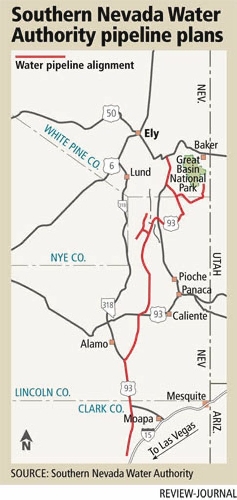Water authority seeks more groundwater from two rural counties
They stop short of asking for it all, but Las Vegas water officials are urging the state to grant them far more rural groundwater than they got the last time around.
In new documents now in the hands of State Engineer Jason King, the Southern Nevada Water Authority lays out its plans to eventually siphon up to 105,000 acre-feet of groundwater a year from four valleys in Lincoln and White Pine counties.
That is roughly 46,000 acre-feet more than the authority received from King's predecessor in separate rulings in 2007 and 2008.
Those decisions were later struck down by the Nevada Supreme Court, prompting last year's marathon water hearing in Carson City.
Authority officials think their case for more water is bolstered by research they have done in the target basins in recent years.
"During the hearing, we introduced a lot of new data," water authority Deputy General Manager John Entsminger said. "We submitted the only new data collected in the period between the last ruling and this one."
King has until late March to rule on the bulk of the water the authority hopes to pipe to Las Vegas through a multibillion-dollar pipeline network stretching more than 300 miles. Most of the water would come from Spring Valley, a vast basin just west of Great Basin National Park.
In an unusual move, King asked the authority and other official participants in last year's six-week hearing to write their own versions of how his final ruling should read.
The authority would get no water at all under most of the draft rulings penned by opponents of the pipeline project.
Opposition groups argue that the water applications should be denied altogether because they would drain the basins, damage the environment and effectively shut out current and future water users across rural Nevada.
New Mexico-based environmental attorney Simeon Herskovits served as the chief voice of the opposition during last year's hearing. He said the authority's critics aren't arguing against all groundwater pumping everywhere or against any activity that impacts the environment in any way.
"But in Spring Valley, the situation is much more stark and simple. Their proposal there is just totally unsustainable and unsound," he said.
Herskovits also contends that the authority failed to prove it can afford to build the pipeline and failed to demonstrate that the water is needed in Southern Nevada and would be put to beneficial use as required by law.
By contrast, the authority submitted four separate draft rulings that allow for the eventual withdrawal of up to 104,854 acre-feet a year, almost 77,000 of it from Spring Valley.
The groundwater would be developed in four stages, starting with an annual withdrawal of up to 38,500 acre-feet in Spring Valley and ramping up every five years if the pumping is deemed "environmentally sound" and does not conflict with existing water rights or domestic wells.
Even if the state engineer decides the authority cannot take any additional water beyond what it withdraws in the first stage of development, Entsminger said the pipeline project still makes financial sense for a community that gets almost all of its supply from a single source.
"Southern Nevada needs to diversify away from its 90 percent dependence on the Colorado River," he said.
He went on to note that the roughly 105,000 acre-feet the authority proposes to develop is about 20,000 acre-feet less than what it originally applied for in the four valleys.
One acre-foot of water is enough to supply two average valley homes for one year. When stretched through reuse, 105,000 acre-feet of water is enough to supply nearly 360,000 average single-family homes.
Entsminger insists the authority's proposed rulings -- all 1,100 pages of them -- were written with "an abundance of caution."
"The state engineer has been saying for the past 10 to 15 years that the proper way to develop groundwater is to do this sort of staged development," he said. "We believe we have provided a conservative plan for development ... that will protect the resource, allow for the collection of new data and provide Southern Nevada with a new water supply."
But to Herskovits, the authority's voluminous proposals are another example of the agency using "massive overkill" to get what it wants.
"I think they are trying to overcompensate with quantity what they lack in quality and integrity in terms of scientific data," he said.
Contact reporter Henry Brean at hbrean@reviewjournal.com or 702-383-0350.
Proposed rulings for Spring, Cave, Dry Lake and Delamar valleys
State of Nevada Division of Water Resources


















